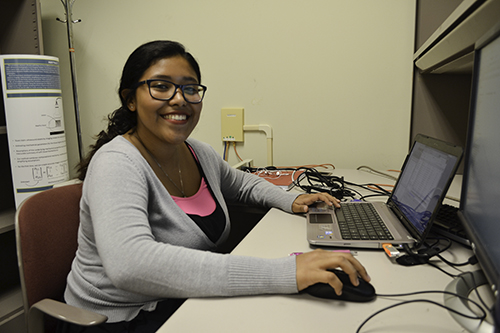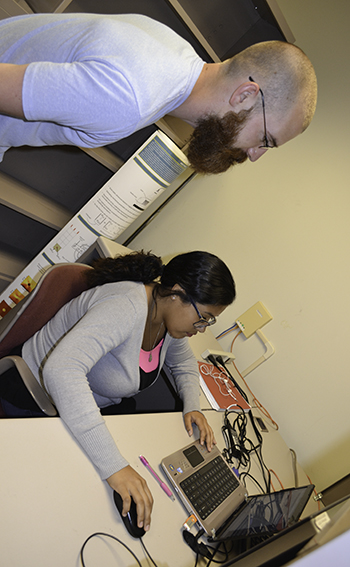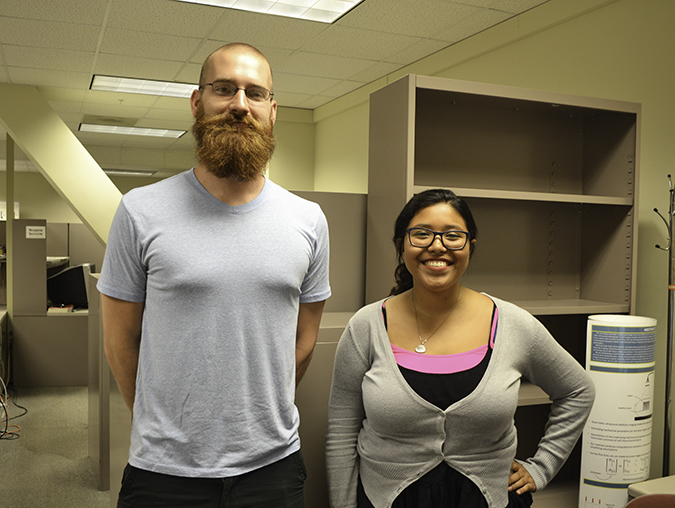Wendy Reyes Learns Life Skills—and to Like Research—in Bioimaging REU

Bioimaging REU participant Wendy Reyes at work in Insana’s Ultrasonic Imaging Lab in Beckman.
July 29, 2016
When rising junior Wendy Reyes spent the summer doing research in Professor Michael Insana’s Ultrasonic Imaging Lab as part of the 2016 Bioimaging REU, she learned a lot. She learned some research skills: how to train software to recognize cancer in the images of breast tissue. She learned some life skills: how to become more organized, to be proactive and not procrastinate, and to overcome her timidity and be bold in seeking assistance. She also learned some things that might be related to her future career: how to apply to grad school, and that she likes research and might want a career in it.
Wendy Reyes, a rising junior majoring in Biomedical Engineering at Catholic University of America in Washington, DC., spent the summer learning about computational mechanics and ultrasound image processing in Michael Insana’s Ultrasonic Imaging Lab. Her project was a machine learning technique that trains artificial neuro networks to learn about properties and distribution of soft tissues. According to her graduate student mentor, Cameron Hoerig, they’re not focusing on building a machine, but training software to recognize cancer in images of breast tissue.
Although Reyes did a small research project in high school, she says this was her first research experience in college. One skill she gained here was learning to become organized and proactive about learning; there were “a lot of self-learnings and reading papers,” says Reyes. “I didn’t know anything about neural networks, so a lot of these things were new to me, and I’m still learning more. I feel a lot more confident than I did at the beginning. I felt overwhelmed at the beginning.”
Another skill she learned? How to be bold when asking questions: “So at first, everyone is new to me,” she acknowledges, “I didn’t know how to approach them, but I learned to do that.”

Illinois Ph.D. student Cameron Hoerig (left) and Bioimaging REU participant Wendy Reyes at work in Insana’s Ultrasonic Imaging Lab in Beckman.
While Reyes says she enjoyed learning about this field, is it something she might want to pursue? “Yes!” she acknowledges “I actually like seeing how things [work]. Before you go to the doctor and you get a 3D imaging done, and you think it’s really cool, but you don’t know how much work was put into it or the process behind it. So I kind of like knowing that, and I want to use what I learned here for the future. But I do like bioimaging.”
Participating in the REU has also helped Reyes decide that she wants to go into research. “At first, I came here to just learn. But now, towards the end, I don’t know what I would do besides research. I like coming up with my own problem and thinking about how to solve it. That aspect I really like about it. If I pursued a PhD, I would also like to teach and help other students find passion in research. I didn’t know a lot about what goes into creating a research project, but now I have a better understanding of it. I want to go into research. I like it, and I think it’s worth it.”
Via the REU and SROP training sessions, Reyes also learned a lot about grad school, for instance, “the application process or what they were looking for,” she explains.
Reyes continues, “I learned a lot about it, learned how to show your best. I also met a lot of people going through the same thing. And also they brought in a lot of professors, and seeing how passionate they were about their work helped me decide.”
While Cameron Hoerig, Reye’s grad student mentor, indicates that all undergrads he’s mentored experience a learning curve because of a lack of programming experience, he says Reyes learned it quickly, and even got some results. “I was working on this for 6 months before I even understood what I was doing,” he admits, “and she has 9 weeks to figure out what’s going on, and make a contribution. But she has learned the necessary material, and definitely pulled out results.”
Reyes was able to “help ants learn material properties like stiff and soft. And right now I’m working to see if they can learn to detect the inclusion without knowing the data.”
While mentoring an REU student makes additional work for grad student mentors at the offset, according to Hoerig, there are definitely benefits to having an undergraduate REU student in the lab.
"So a lot of the research is not fun stuff,” Hoerig admits. “Basically just clicking buttons and seeing what happens. So it’s definitely difficult to train them on how to use so many programs at once. But as far as the summer students go, they can do something to move the project forward. Not the fun part of it, but it definitely moves the project forward. And the results they produce are important. The more difficult part is to explain what the big picture is. I’m not sure how much progress she thinks she made on the project, but she made a tremendous progress on moving it forward. From four months ago to what she has done in the last eight weeks is far more than what I had done before, just because someone else is out there to process the data. And it’s just on me to figure out why what happened.”
Reyes says she also learned some skills that will be of benefit to her as a student. “I have learned to do things earlier. That has changed my perspective on how I will do things at school. So do things little by little and start work early.”
She’s also gotten over her fear of approaching professors: “Another thing that has changed is learning how to reach out,” she admits. “PI’s, they are extremely busy. It was a little scary at first, but then I learned how to get in contact with them and email them.”
As far as the REU program goes, Hoerig thinks it’s a really good experience. “Not many people know what research is like. It’s not just doing research and publishing papers all the time, the papers don’t show how much incremental work went into the project. And it can be discouraging to people, because it can be worrisome at times, but I think it all pays off at the end. It all makes sense at the end, as the results tie everything together. The REU program shows how it works and how much work goes into it. Especially making the transition from undergrad to grad student, there a lot of self-learning, and you can’t just do a google search and find all your answers. And hopefully she found that she likes doing it.”
Story and photographs by Elizabeth Innes, Communications Specialist, I-STEM Education Initiative
For more related stories, see:
BioE, Funded, REU, REU: Bioimaging, Student Spotlight, Summer Research Programs, Undergrad, 2016
For additional istem articles about summer 2016 REUs, see:
- POETS REU Helps Illinois Undergrad Sabrina Yin Choose Her Career Path
- Undergrads Consider Nanotechnology Careers Thanks to nano@illinois REU
- Undergrads in Bioimaging REU Experience What Research, Graduate School Is Like
- Bioimaging REU's Matt Kavanaugh Experiences Cancer Research at Illinois
- 2016 Chemistry REU Offers Undergraduate Students a Glimpse of Grad Life

Left to right: Illinois Ph.D. student Cameron Hoerig and his mentee for the summer, Bioimaging REU participan Wendy Reyes.













.jpg)
















